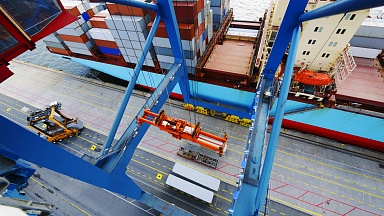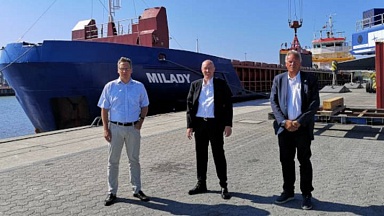On Friday, the Shanghai Containerised Freight Index showed a 4% drop in Shanghai-North Europe rates, to $2,851 per teu.
Meanwhile, Korea Ocean Business Corporation’s Container Composite Index, based on departures from Busan, yesterday showed a 3% drop in rates for North Europe-bound shipments, averaging $5,283 per feu.
Similarly, the Ningbo Containerised Freight Index, compiled by the port of Ningbo, saw its China-North Europe drop 4% between 27 December and 3 January, and noted: «At the beginning of the month, liner companies arranged more vessels schedules, lowered freight rates and strengthened cargo collection.»
However, the index-based figures may not give a full picture of what could be an emerging rate war, as Linerlytica’s report this week noted that Maersk had gone on the offensive by being among the first major carrier to slash rates.
The consultancy said: «Maersk has again adopted an aggressive pricing strategy, quoting less than $4,000 per 40ft container for shipments in the latter half of January, prompting MSC to match the move, with rates of $3,840, setting the stage for rate discounts from their rivals.
«Carriers are rolling back their rate quotations in January with an eye towards filling their forthcoming sailings and building a roll pool for the post-Chinese New Year slack,» it added.
This is in contrast to transpacific rates, which have been supported by fears of US east coast port workers going on strike on 15 January, as well as series of general rate increases (GRIs) through December and into January.
While there could be 50% more blanked sailings in February, the reshuffle of the container shipping alliances next month could offer breathing space, as the transition to the Gemini, MSC standalone and Premier Alliance services are expected to severely disrupt scheduled sailings.
Nevertheless, both shippers and carriers believe Asia-North Europe freight rates will decline over the rest of the year.
Yesterday, Asia-North Europe container freight futures plunged between 4% and 11% week on week, with April contracts taking the hardest hit.
The April (EC2504) contract closed at 1,441 points, down 11% from the previous week, while the February (EC2502) contract closed at 2,033 points, a 9% drop from the previous week, reflecting rising concerns over carriers’ aggressive pricing in January and further rate cuts expected post-Chinese New Year.





